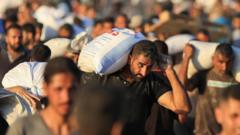As negotiations stall, Hamas has reaffirmed its commitment to retaining arms until a sovereign Palestinian state is created, responding to calls for disarmament amidst ongoing hostilities in Gaza.
Hamas Stands Firm on Disarmament Amid Ceasefire Talks with Israel

Hamas Stands Firm on Disarmament Amid Ceasefire Talks with Israel
Hamas insists it will not disarm until a Palestinian state is established, rejecting Israel's precondition for a ceasefire.
Hamas has stated unequivocally that it will not disarm unless a fully independent Palestinian state with Jerusalem as its capital is established. This response comes amidst heightened negotiations between Israeli officials and Hamas as they seek a ceasefire agreement and the release of hostages captured during recent conflicts. The comments attributed to U.S. Middle East envoy Steve Witkoff, who suggested that Hamas might be open to disarmament, have been firmly rejected by the militant group.
Israel has placed disarmament central to its conditions for any potential ceasefire, leading to mounting pressure from various Arab governments and Western nations. Countries like France and Canada are poised to enhance their recognition of Palestinian statehood if Israel does not meet specific conditions by September. Hamas, however, remains steadfast, asserting its right to resistance and weapons possession in the absence of a recognized Palestinian state.
The urgency of the situation is underscored by warnings from the Israel Defense Forces (IDF) that without rapid negotiations yielding hostages' release, the fighting will continue unabated. In a concerning development, the family of Evyatar David, a hostage held by Hamas, has issued emotional pleas for intervention after a video release showed him in distressing condition.
Recent statements from international organizations paint a grim picture of the humanitarian crisis in Gaza, with reports of severe malnutrition and large-scale casualties linked directly to military actions in the region. As Witkoff engages with Israeli families affected by the ongoing crisis, he emphasizes the need for a comprehensive peace solution that prioritizes the return of all hostages over fragmented agreements.
This complex situation continues to evolve, amidst allegations regarding the conduct of both sides, as the toll of hostilities mounts with over 60,000 lives lost in Gaza since the outbreak of violence. The humanitarian ramifications highlight the urgent need for resolution amidst an increasingly desperate scenario for civilians caught in the conflict. The world watches as hopes for diplomatic solutions hang in the balance.
Israel has placed disarmament central to its conditions for any potential ceasefire, leading to mounting pressure from various Arab governments and Western nations. Countries like France and Canada are poised to enhance their recognition of Palestinian statehood if Israel does not meet specific conditions by September. Hamas, however, remains steadfast, asserting its right to resistance and weapons possession in the absence of a recognized Palestinian state.
The urgency of the situation is underscored by warnings from the Israel Defense Forces (IDF) that without rapid negotiations yielding hostages' release, the fighting will continue unabated. In a concerning development, the family of Evyatar David, a hostage held by Hamas, has issued emotional pleas for intervention after a video release showed him in distressing condition.
Recent statements from international organizations paint a grim picture of the humanitarian crisis in Gaza, with reports of severe malnutrition and large-scale casualties linked directly to military actions in the region. As Witkoff engages with Israeli families affected by the ongoing crisis, he emphasizes the need for a comprehensive peace solution that prioritizes the return of all hostages over fragmented agreements.
This complex situation continues to evolve, amidst allegations regarding the conduct of both sides, as the toll of hostilities mounts with over 60,000 lives lost in Gaza since the outbreak of violence. The humanitarian ramifications highlight the urgent need for resolution amidst an increasingly desperate scenario for civilians caught in the conflict. The world watches as hopes for diplomatic solutions hang in the balance.

















